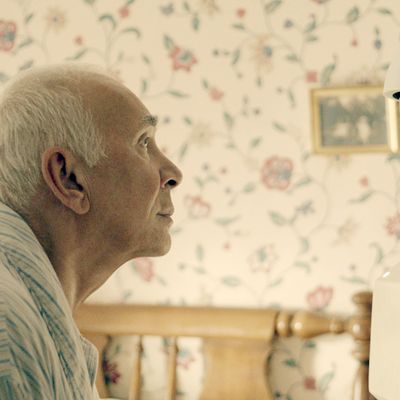
The robot of Robot & Frank is a small, white, surprisingly lightweight thingamajig that looks like a childs spaceman toy. Frank is Frank Weld (Frank Langella), a prideful exjewel thief in the early stages of dementia whose son, Hunter (James Marsden), gives him a stern choice: Allow the robot to clean and cook and look after him, or move into a memory center. Frank fumes and calls the robot a hunk of crap and refuses to accept any help  for about ten minutes. But he comes around, as he must, and therein lies a tale  a puckish, wistful tall tale set in the near future, a screwball machine dream.
Watching Langella, you barely remember him as the too-beautiful juvenile with the lordly mien whose signature role became Count Dracula. Aspects of that lordliness linger, of course. But Langella is a canny fellow. He now uses his own arrogance to generate a startling amount of sympathy for the characters he plays: Leonard the forgotten novelist in Starting Out in the Evening (a once-in-a-lifetime performance); Richard the Trickyhearted in Frost/Nixon; and now Frank in Robot & Frank, a man who cant always remember his children but still knows how to pick a lock, crack a safe, and devise an elaborate heist. With no past and an elusive present, Frank is too lumbering and inconstant to pull off the kind of job that will make him feel whole again. But if he had an assistant  someone fleeter, with a reliable memory.
The first feature of director Jake ┬¡Schreier and screenwriter Christopher ÔÇëD. Ford, ┬¡Robot & Frank has a clean, unfussy palette and a casual pace that keep it from seeming dear ÔÇö not that proud Langella would ever be caught angling for the audienceÔÇÖs sympathy. Ford has rigged the plot so that the loss of FrankÔÇÖs memory is juxtaposed with the end of libraries as we know them (theyÔÇÖve all become digitized) and the repurposing of a local (Cold Spring, New York) branch by a sneering yuppie (Jeremy Strong) as a kind of pre-digital nostalgia palace. The subplot is convoluted (an antique edition of Don Quixote figures in, probably to underscore the magnificent futility of FrankÔÇÖs Quest), but the library scenes have a lovely vibe thanks to Susan Sarandon as the bright-eyed librarian, Jennifer. Her attitude toward Frank is tantalizingly difficult to read: SheÔÇÖs tender, a shade maternal, as if she knows all about his larcenous history and short-circuiting brain. But sheÔÇÖs coquettish, too. She likes him that way, maybe.
The real love match of the movie is the robot and Frank. Is the robot a mere machine or does he ÔÇö I mean, it ÔÇö I mean, he, damn it ÔÇö evolve into something that is? Can this entity that can hold so many memories not be a true and meaningful friend? The question is especially apt since the voice that comes from that big black impenetrable visor on that little white gleaming machine belongs to Peter Sarsgaard, an actor with the most delicate vocal shadings in movies. Like his obvious spiritual god┬¡father, John Malkovich (whose son he played ÔÇö drolly ÔÇö in The Man in the Iron Mask), Sarsgaard can do flat-line readings with the teeniest quavers (you can almost visualize them on a hospital monitor) to signal emotion. His robot deadpan is neither robotic nor dead: ThereÔÇÖs always a mind in evidence, weighing its central directive ÔÇö to keep Frank healthfully engaged ÔÇö against the larger question of risk. Planning a robbery will make Frank happier and more directed than, say, gardening. But what if heÔÇÖs caught and goes to jail? Where do you draw the line? ThatÔÇÖs a tough balance for even an artificial intelligence to maintain.
Now and then you catch Schreier and Ford playing fast and loose with FrankÔÇÖs mental infirmities, first using them for pathos and then showing him one-upping the snotty yuppie and town sheriff. And itÔÇÖs not always clear when Frank truly doesnÔÇÖt remember something and when heÔÇÖs putting on a forgetful act for his son or busybody daughter (Liv Tyler). But Robot & Frank, like its protagonist, is charming enough to get by with the sleight-of-hand. Its irresponsibility redeems it ÔÇö itÔÇÖs a raspberry blown against the dying of the light.
This review was originally posted on nymag.com.


